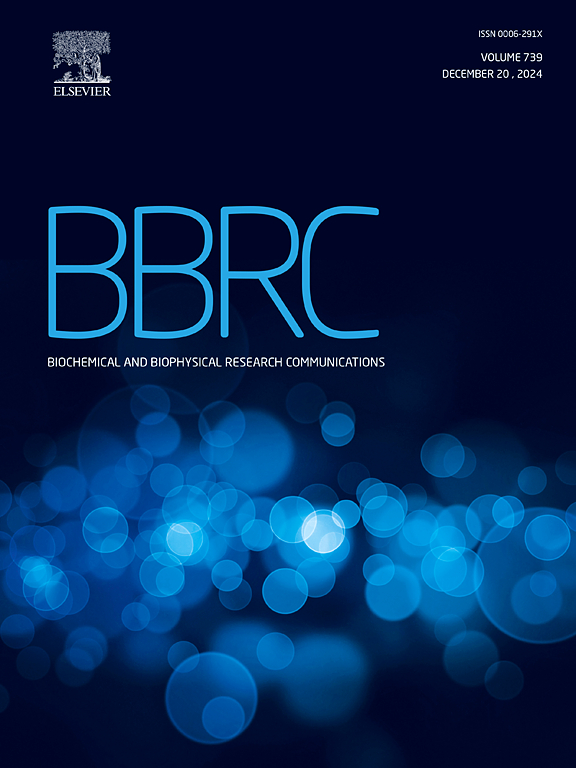ZBTB12 promotes breast cancer progression through transcriptional activation of the DNMT3B/ALDH1A2 axis
IF 2.2
3区 生物学
Q3 BIOCHEMISTRY & MOLECULAR BIOLOGY
Biochemical and biophysical research communications
Pub Date : 2025-06-16
DOI:10.1016/j.bbrc.2025.152214
引用次数: 0
Abstract
Breast cancer (BC) is a prevalent malignant neoplasm. Utilizing the GEPIA database for analysis and subsequent validation via reverse transcription quantitative polymerase chain reaction (RT-qPCR), we identified that aldehyde dehydrogenase 1 family member A2 (ALDH1A2) exhibits reduced expression and heightened methylation in BC, which is associated with an unfavorable prognosis. In vitro cellular assays demonstrated that the overexpression of ALDH1A2 attenuates the proliferative, invasive, and migratory capacities of breast cancer cell lines, concurrently reducing apoptotic rates. Subsequent investigations employing Methylation-Specific PCR and Western blot analysis in breast cancer cells uncovered that DNA methyltransferase 3B (DNMT3B) is implicated in the DNA methylation of ALDH1A2, with the suppression of DNMT3B leading to an elevation in ALDH1A2 protein levels, thereby establishing an inverse relationship between DNMT3B and ALDH1A2. Furthermore, through the prediction of transcription factors binding to the promoter region of DNMT3B, we discerned that zinc fingers and BTB domain containing 12 (ZBTB12) transcriptionally activates DNMT3B, thereby repressing ALDH1A2 expression. Cellular assays revealed that the knockdown of ZBTB12 or the overexpression of DNMT3B correspondingly inhibits or enhances the proliferative, invasive, and migratory capabilities of breast cancer cells, with DNMT3B abrogating the suppressive effects of si-ZBTB12. Our findings elucidate a novel mechanism involving ALDH1A2 in the progression of breast cancer, where ZBTB12 transcriptionally activates DNMT3B, and the ZBTB12-DNMT3B axis orchestrates the methylation and consequent silencing of ALDH1A2.
ZBTB12通过DNMT3B/ALDH1A2轴的转录激活促进乳腺癌进展
乳腺癌是一种常见的恶性肿瘤。利用GEPIA数据库进行分析,并随后通过反转录定量聚合酶链反应(RT-qPCR)进行验证,我们发现乙醛脱氢酶1家族成员A2 (ALDH1A2)在BC中表达减少,甲基化升高,这与不良预后相关。体外细胞实验表明,ALDH1A2的过表达减弱了乳腺癌细胞系的增殖、侵袭和迁移能力,同时降低了凋亡率。随后在乳腺癌细胞中采用甲基化特异性PCR和Western blot分析发现,DNA甲基转移酶3B (DNMT3B)与ALDH1A2的DNA甲基化有关,抑制DNMT3B导致ALDH1A2蛋白水平升高,从而建立了DNMT3B与ALDH1A2之间的反比关系。此外,通过预测DNMT3B启动子区结合的转录因子,我们发现锌指和BTB结构域包含12 (ZBTB12)转录激活DNMT3B,从而抑制ALDH1A2的表达。细胞实验结果显示,下调ZBTB12或过表达DNMT3B可相应抑制或增强乳腺癌细胞的增殖、侵袭和迁移能力,而DNMT3B可取代si-ZBTB12的抑制作用。我们的研究结果阐明了ALDH1A2参与乳腺癌进展的新机制,其中ZBTB12转录激活DNMT3B, ZBTB12-DNMT3B轴协调ALDH1A2的甲基化和随后的沉默。
本文章由计算机程序翻译,如有差异,请以英文原文为准。
求助全文
约1分钟内获得全文
求助全文
来源期刊
CiteScore
6.10
自引率
0.00%
发文量
1400
审稿时长
14 days
期刊介绍:
Biochemical and Biophysical Research Communications is the premier international journal devoted to the very rapid dissemination of timely and significant experimental results in diverse fields of biological research. The development of the "Breakthroughs and Views" section brings the minireview format to the journal, and issues often contain collections of special interest manuscripts. BBRC is published weekly (52 issues/year).Research Areas now include: Biochemistry; biophysics; cell biology; developmental biology; immunology
; molecular biology; neurobiology; plant biology and proteomics

 求助内容:
求助内容: 应助结果提醒方式:
应助结果提醒方式:


